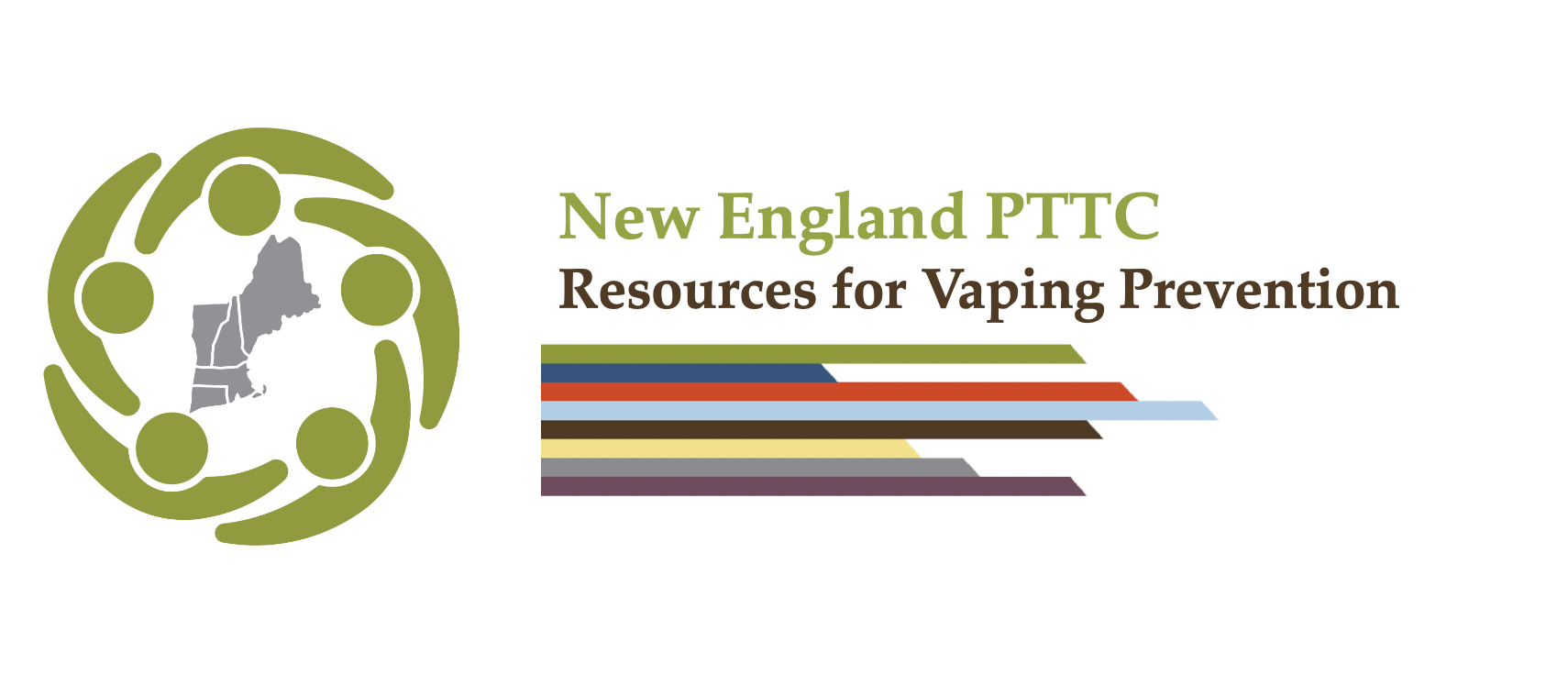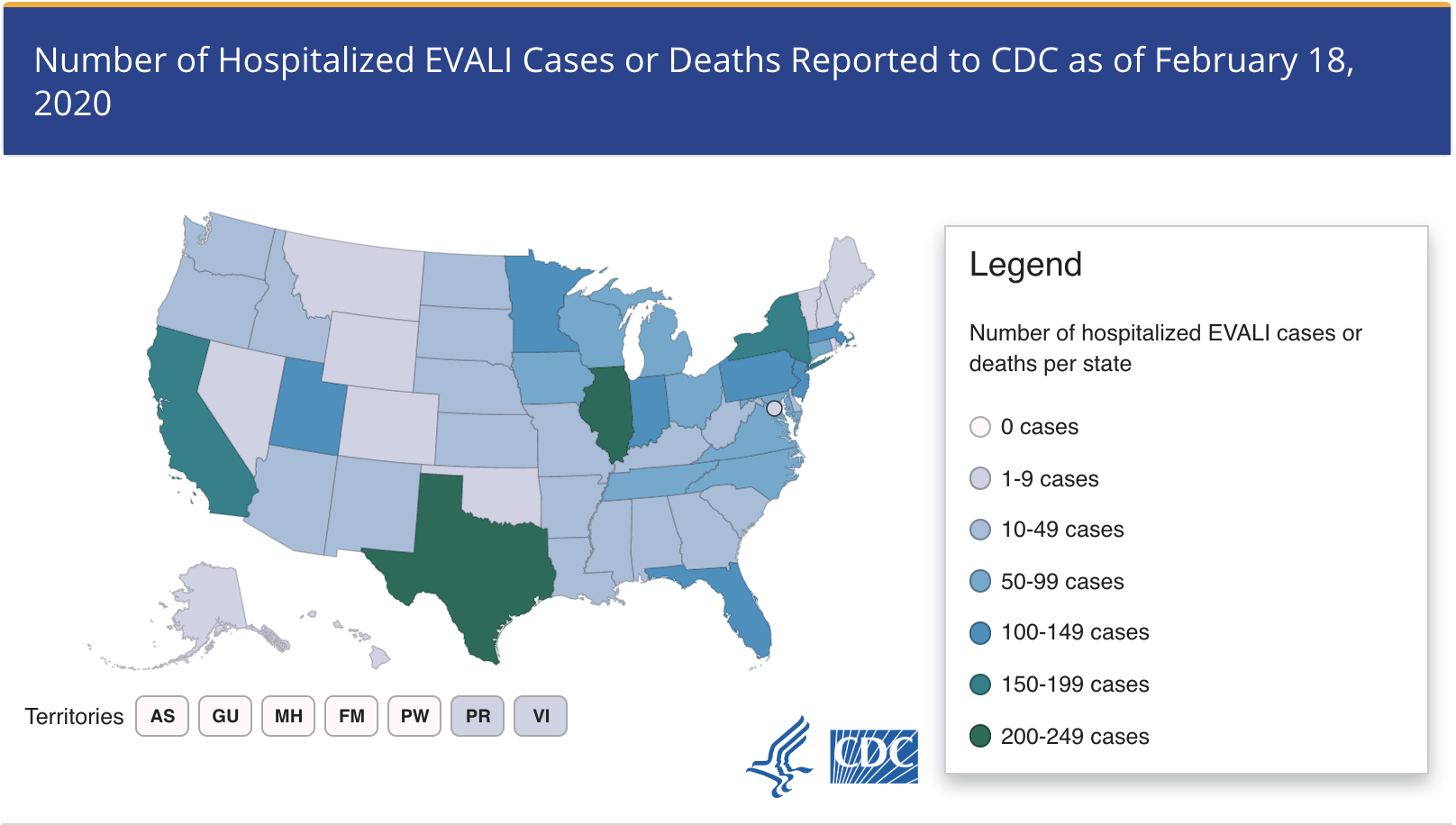
It is important for the prevention community to know and understand the risks related to vaping. The New England PTTC has created this page to bring together the latest health advisories from the CDC, the Surgeon General's office, and other federal partners, as well as the health departments of the six New England states. We have also posted some helpful information resources and vaping prevention toolkits from each of the six New England states. We have also included some recorded webinars and other products from our sister PTTC's.
We will continue to update this page with the latest federal and state health advisories and tools and resources you can use in your community to respond to this urgent public health crisis. If you have other training and technical assistance needs around vaping and vaping prevention, please contact us at [email protected]
Vaping Health Advisories, Toolkits, and Information Resources from New England States:
Maine:
New Hampshire:
Vermont:
Massachusetts:
Connecticut:
Rhode Island:
Federal agencies and national associations provide the following resources related to vaping:
Resources from the PTTC and ATTC Networks:
Central East ATTC:
Great Lakes PTTC:
Mountain Plains PTTC:
Mid-America PTTC:
National PTTC:
National Hispanic & Latino PTTC:
New England PTTC
- Microlearning Toolkit: Vaping Prevention 101 - Brush up on your cannabis knowledge with this series of short lessons on vaping and prevention! Each lesson consists of a 5-10 minute video followed by a brief quiz. Topics include: effects of nicotine on the adolescent brain, public health implications of youth ENDS use and why vaping/e-cigarette use appeals to youth.
- In the Air is a graphic medicine built to foster conversations with and among young people around vaping, choices about substance use, and social factors. This graphic novel-styled story of five teens going through high school incorporates behavioral science of substance misuse prevention with the stories, interests, and ideas of members of the Tobacco Free Rhode Island Youth Ambassadors. The novel has questions to help guide the discussion, a strong research base, and roots in risk and protective factors.
Northwest PTTC:
Pacific Southwest PTTC:
Tobacco and Vaping Prevention Toolkits:
Stanford University Tobacco Prevention Toolkit - Modules for tobacco and nicotine education. Includes modules on e-cigs and vapes
The Real Cost Campaign - Messaging campaign and associated tools and fact sheets from the U.S. Food and Drug Administration (FDA)
Tips for Teens: E-Cigarettes - Resource from SAMHSA: This fact sheet for teens provides facts about vaping. It describes short- and long-term effects and lists signs of vaping. The fact sheet helps to dispel common myths about vaping. Access sources and references cited in this fact sheet.
Journal & Research Articles:
A Look at Harmful Vaping Side Effects - Grand Canyon University
E-Cigarettes and Vaping-Related Disease - collection of articles and other resources on e-cigarettes and vaping-related disease, including clinical reports and commentary.
Trends in Adolescent Vaping, 2017-2019, New England Journal of Medicine.
Severe Pulmonary Disease Associated with Electronic-Cigarette–Product Use — Interim Guidance, Centers for Disease Control and Prevention, Morbidity and Mortality Weekly Report
Reduce your risk of serious lung disease caused by corona virus by quitting smoking and vaping by Stanton A. Glantz, PhD, Director, Center for Tobacco Research Control & Education
HINTS Brief 42: E-cigarette Perceptions and Experimentation Among US Adults, examines e-cigarette perceptions and whether perceived harm and addictiveness are associated with trying e-cigarettes among US adults.
Youth e-cigarette use is down, but 3.6 million still use e-cigarettes, Centers for Disease Control and Prevention, Newsroom Press Release
Nurses Explore the Health Effects of Vaping, Nursing at Georgetown University
As of February 18, 2020, a total of 2,807 hospitalized EVALI cases or deaths have been reported to CDC from all 50 states, the District of Columbia, and two U.S. territories (Puerto Rico and U.S. Virgin Islands).
- Sixty-eight deaths have been confirmed in 29 states and the District of Columbia (as of February 18, 2020).
- Emergency department (ED) visits related to e-cigarette, or vaping, products continue to decline, after sharply increasing in August 2019 and peaking in September.
- National ED data and active case reporting from state health departments around the country show a sharp rise in symptoms or cases of EVALI in August 2019, a peak in September 2019, and a gradual, but persistent decline since then.
- Reasons for the decline are likely multifactorial and may be related to the following:
- Increased public awareness of the risk associated with THC-containing e-cigarette, or vaping, product use as a result of the rapid public health response.
- Removal of vitamin E acetate from some products.
- Law enforcement actions related to illicit products.
- Laboratory data show that vitamin E acetate, an additive in some THC-containing e-cigarette, or vaping, products, is strongly linked to the EVALI outbreak.
- A recent study external icon analyzed samples from 51 EVALI cases from 16 states and a comparison group of samples from 99 comparison individuals without EVALI for vitamin E acetate, plant oils, medium chain triglyceride (MCT) oil, coconut oil, petroleum distillates, and diluent terpenes.
- Vitamin E acetate was identified in bronchoalveolar lavage (BAL) fluid samples (fluid samples collected from the lungs) from 48 of the 51 EVALI patients, but not in the BAL fluid from the healthy comparison group.
- No other toxicants were found in BAL fluid from either group, except for coconut oil and limonene (1 EVALI patient each).
- Due to continued declines in new EVALI cases since September 2019, and the identification of vitamin E acetate as a primary cause of EVALI, today’s release is the final CDC update on the number of hospitalized EVALI cases and deaths nationally. CDC will continue to provide assistance to states, as needed, related to EVALI and will provide any updates at: www.cdc.gov/lunginjury.
What CDC Recommends
- CDC and FDA recommend that people not use THC-containing e-cigarette, or vaping, products, particularly from informal sources like friends, family, or in-person or online dealers.
- Vitamin E acetate should not be added to any e-cigarette, or vaping, products. Additionally, people should not add any other substances not intended by the manufacturer to products, including products purchased through retail establishments.
- Adults using nicotine-containing e-cigarette, or vaping, products as an alternative to cigarettes should not go back to smoking; they should weigh all available information and consider using FDA-approved smoking cessation medicationsexternal icon. If they choose to use e-cigarettes as an alternative to cigarettes, they should completely switch from cigarettes to e-cigarettes and not partake in an extended period of dual use of both products that delays quitting smoking completely. They should contact their healthcare professional if they need help quitting tobacco products, including e-cigarettes, as well as if they have concerns about EVALI.
- E-cigarette, or vaping, products (nicotine- or THC-containing) should never be used by youths, young adults, or women who are pregnant.
- Adults who do not currently use tobacco products should not start using e-cigarette, or vaping, products.
- THC use has been associated with a wide range of health effects, particularly with prolonged frequent use. The best way to avoid potentially harmful effects is to not use THC-containing e-cigarette, or vaping, products.
- Persons engaging in ongoing cannabis use that leads to significant impairment or distress should seek evidence-based treatment by a healthcare professional.
All of the states in New England are being impacted by this urgent public health crisis. Refer to the map below which provides the number of lung injury cases in each state:

Other resources:

